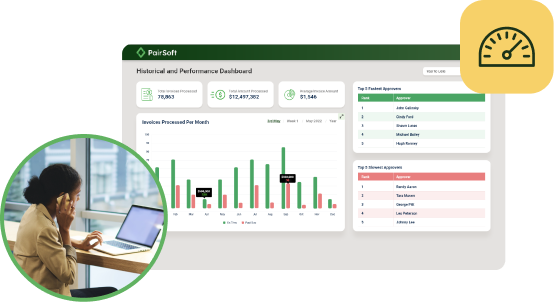
PairSoft
The strongest AP automation, document management, procurement, and fundraising automation platform for mid-market and enterprise companies with integrations to your ERP system.
View all posts by PairSoftPairSoft

Your company and its suppliers are mutually dependent, and favorable relationships amplify the capacity of both of you to create value and foster quality management. In fact, strong supplier relationships are considered so foundational to a company’s overall success that Supplier Relationship Management (SRM) is one of the ISO 9000:2015 Principles of Quality Management. Here we’ve identified three powerful benefits of strong supplier relationships.
Forming strong supplier relationships makes smart financial sense. A company can reduce costs by consolidating its vendor pool into a smaller number of strategic partners and centralizing purchasing activity with those suppliers. Why does that matter? In a study by Hackett Group, top performing companies had 2.3 times fewer strategic suppliers than their lower-performing peers.
Consolidation of suppliers creates a more streamlined and efficient supply chain, reducing internal workloads and soft costs while increasing opportunities to reduce costs through economies of scale and leveraged spend.
By systematically reducing your supplier pool and partnering with key suppliers, companies can receive better pricing, lower shipping costs and increase their volume buying power. In the aforementioned Hackett Group study, reducing suppliers contributed to a 3.35% cost reduction for indirect spend and a 9.18% reduction for general equipment and supplies in the top quartile of companies participating.
For many companies (manufacturers in particular) products procured from suppliers represents 50-80% of the total product cost. With so much investment trusted to suppliers, ensuring consistent quality is vital to a company’s success.
A collaborative SRM strategy offers significant opportunities to realize improvements in supplier quality. In part, this is a consequence of the investment in regular meetings with preferred suppliers to discuss and strategize all aspects of business performance. In addition, by openly sharing data related to product quality, shipping or billing errors, or late deliveries, companies can build a collaborative relationship that works toward continuous quality improvement, benefitting both parties.
In addition, with a smaller number of key suppliers, it’s much simpler to track vendor performance and ensure contractual performance is met, enabling you to maintain a consistent set of quality standards for the products and services your company buys.
Companies who develop strong supplier relationships will have lower overall transactional costs. With fewer suppliers to handle, the costs involved in setting up a supplier in internal systems, completing transactions, and managing the ongoing relationships significantly decreases.
Having contracts with a smaller number of suppliers and centralizing purchasing consolidates and reduces the overall number of transactions, reducing processing costs and giving you more control over billing. Fewer contracts to negotiate results in significant time savings, as contract negotiation can consume up to 50% of procurement professionals’ time. And fewer orders are easier to track, requiring fewer hours of administrative work, freeing your resources for more strategic tasks.
In a global research study by Vantage Partners, 35% of the companies participating reported that their companies’ SRM programs yield “considerable” value, and 50% reported that they “consistently get the best people, best pricing, and best ideas from their key suppliers, thereby gaining a competitive advantage to their competitors.” A full 70% of respondents in the same study indicated that SRM will be “very important” to their company’s success over the next three to five years.
So, while Supplier Relationship Management is a topic of importance among companies, many struggle with the best ways to grow the practice. A 2018 survey of Chief Procurement Officers found that while 74% of respondents acknowledge the importance of obtaining more value from existing suppliers through SRM, a full 51% have only a low or moderate ability to meet this objective. In our next post, we’ll offer up proven methods for improving supplier relationships.


Many organizations start with manual receipt handling, fragmented card feeds and slow AP processes. Implement AI agents to auto-capture receipts, route approvals, enable punch-out buys and post to the ERP.
Result: faster batching, fewer errors and cost savings. “This saves us hours every month.”
Many organizations face slow, paper-heavy AP and fragmented procurement that waste time and inflate costs. AI Agents can automate approvals, PO matching and record sync to improve speed, accuracy and control. Client quote: “It freed up hours and made our process reliable.”
Operational drag and rising costs slow growth: teams waste time on manual tasks, misaligned priorities and opaque processes. AI Agents help automate routine work and coordinate actions across teams. “We’ve lost time to repeats and handoffs,” says a typical client.
Companies struggle with manual procurement, fragmented approvals, and costly integrations that slow growth and obscure spend. Our AI Agents streamline requisitions, POs, and invoice matching to cut manual work and improve visibility. “We were wasting time and missing insights,” says a client.

Many teams start with fragmented PO/AP systems, manual matching and delayed financial reporting. Deploying AI agents to automate PO checks, real-time encumbrance tracking and invoice matching reduces processing time and errors, delivering live budgets and faster closes. “Finally, we can see current balances and approve instantly.”
Many companies juggle growing invoice volumes and legacy systems. They struggle with manual processes, compliance gaps and limited headcount. Our AI Agents automate integrations, enforce rules and surface exceptions. The typical outcome: faster closes and measurable ROI. “We stopped chasing invoices.”